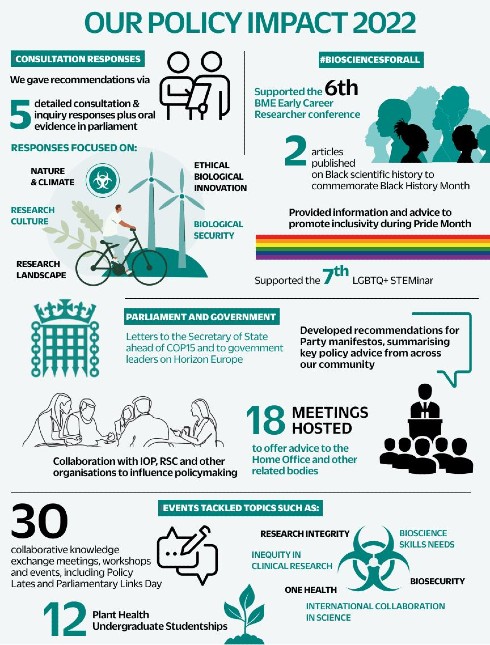Helping you tackle the world’s challenges

Dr Laura Marshall explains the Society’s science policy priorities for the next five years
The COVID-19 pandemic, the ongoing effects of climate change, biodiversity loss and chemicals pollution, the rapid development of new technologies and the risks to global food security all demonstrate the importance of biology and have raised the public profile of biologists.
The Society’s science policy team could work on a vast number of consultations, inquiries and initiatives related to or relevant to science. So, to focus our resources and further our aim to help society tackle major challenges in ethical and sustainable ways, the RSB has developed a set of science policy priorities for the next five years.
These priorities have been developed through recommendations from our community, horizon-scanning research and ongoing measurement of the impact of our work (our 2022 annual impact review is summarised here). The priorities link to the RSB’s wider strategic objectives and, with our vision and mission statements, describe our intended impact in the science policy arena.
Our areas of focus for the next five years, not in order of importance, are:
Knowledge exchange, information sharing and building trust in the biosciences – enabling dialogue between bioscientists, policymakers and the public, and providing evidence synthesis. We are working towards a world where individual and society-wide discussion, decision-making and policymaking is well informed by relevant evidence from the biosciences.
Ethical biological innovation – providing evidence-based advice to policy on the technological and ethical implications of the use of animals and genetic knowledge in research.
Excellence in research, in animal welfare, in social responsibility and in environmental sustainability must go hand in hand. We want to promote the responsible advancement and use of research and innovation, and to help ensure that UK systems regulating the use of animals and the use of genetic knowledge in research are fit for purpose and world-leading. Integral to this, we want to support public dialogue, debate and decision-making that is evidence-informed.
Biological security – advancing training and standards in biosecurity and advocating for One Health evidence and principles in policymaking. We want to support policymaking that optimises the use of evidence so that our society – and the ecosystems; health systems; and food, feed, fuel and construction material production systems we rely on – are able to avert, and are resilient to, disease, biological attacks and other biological risks.
Nature and climate – raising the profile of biodiversity loss and chemicals and waste pollution in policymaking, and providing evidence on the connectedness of global challenges, including climate change.
We are working towards a world where sustainability is optimised through evidence generation, synthesis and implementation; where natural environments and ecosystems are well monitored, protected and thriving; and where the natural capital and ecosystem services benefits for human health are recognised and nurtured through evidence-based and integrated policymaking.
Research culture – empowering and supporting underrepresented communities in the biosciences and advising on ethics and integrity standards in research.
Our research communities should reflect the diversity of the society they serve. Progress to tackle underrepresentation in the biosciences should be optimised through evidence, including the experiences and advice of underrepresented communities themselves. We want to support continued development in the culture of research, through dialogue and debate between people from the widest range of backgrounds possible.
Research landscape – providing evidence and advice on the development of the bioscience workforce, research infrastructure, funding, and the communication of research, including a focus on research reproducibility and open access.
We want to play a role in ensuring that research systems are evidence-based, effective and efficient; enabling excellence and delivering innovations that meet and anticipate the needs of society.
Dr Laura Marshall MRSB is the RSB's head of science policy.
For more on our impact, see our impact analysis here. To receive weekly science policy updates, including calls to contribute to RSB’s work, subscribe to our science policy newsletter. Or to just get in touch, contact science.policy@rsb.org.uk.



